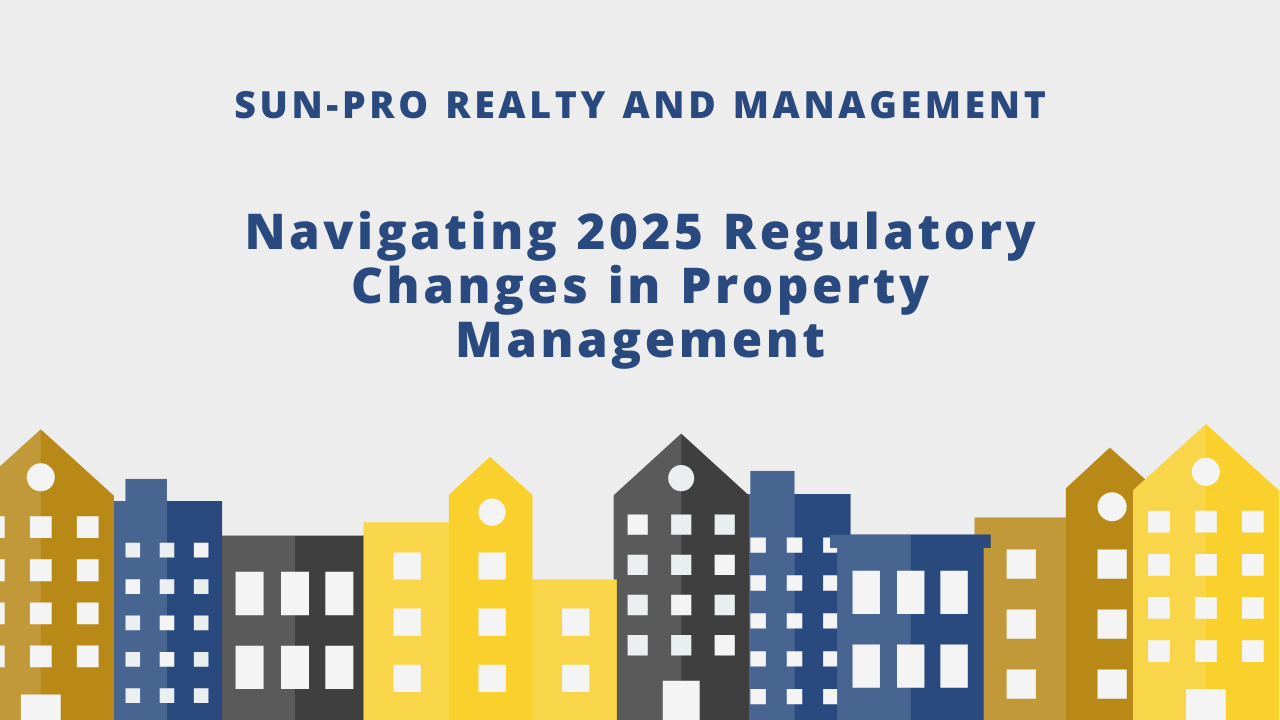
Key Takeaways
- Stay Informed: 2025 regulations demand greater transparency, digital recordkeeping, and tenant protection, knowledge is key to compliance.
- Plan Strategically: Factor new licensing, inspection, and energy efficiency requirements into your operating budgets and upgrade plans.
- Partner Wisely: Working with experts like Sun-Pro Realty and Management helps ensure compliance, protect assets, and maximize long-term returns.
Investment real estate and landlord-tenant relationships are among the most regulated areas of the economy. These rules aim to balance the interests of governments, communities, tenants, and property owners.
Regulations continue to evolve, and 2025 has brought several important updates that affect property investors and managers. Staying informed is essential for protecting assets and maintaining profitability.
At Sun-Pro Realty and Management, we monitor these changes to help clients stay compliant and successful. This post explains how the property management regulatory environment has shifted in 2025, what the new rules mean for your business, and how to adapt your strategy for continued success.
Keep reading to learn more!
2025 Real Estate Regulations and How to Navigate Them
Accuracy in Advertising and Transparency in Pricing
When marketing your rental, the photos and descriptions used must be a true depiction of the property. Additionally, in some jurisdictions, when marketing a rental property, “all-in” pricing is now the standard. Instead of a teaser rent, rental ads must state the total price. The goal is to discourage the addition of "junk fees" to transactions.
How should you respond? For long-term results and to attract quality tenants, your property marketing strategy should already prioritize transparency and accuracy. Use plain language in your ads, and if tenants are required to pay a fee before taking possession of a property, disclose it from the start.
Rental Property Registration and Licensing
Several municipalities are introducing laws that require landlords/property managers to register their rental properties yearly and obtain a landlord license.
These laws may be accompanied by new rental inspection programs that mandate yearly health/safety inspections for rental properties. These new laws aim to help local governments maintain housing standards.

How should you respond? If you own or manage an investment property in one of these jurisdictions, you should find out what the registration fees and inspection costs are. These costs should be included when calculating the operating budgets for your building.
Digitized Processes and Digital Recordkeeping
More municipalities now require landlords and property managers to maintain a digital version of important documents and communications. Forms and notices issued to prospective or existing tenants, even when physical, must have digital copies. Local authorities and courts now place more weight on accurate digital documentation and processes.
How should you respond? This is something you should already be doing: investing in property management software for complete and secure documentation. In disputes with tenants, landlords who present properly organized, date-stamped digital records have the upper hand.
Rent Control Measures
To address the current housing affordability crisis, regions are adopting sweeping rent control ordinances. A practice once limited to cities is seeing statewide implementation.
How cities approach this problem varies; some are responding with outright caps, others are more flexible, and yet others impose additional limits. These laws attempt to protect tenants while recognizing landlords’ financial needs.
How should you respond? Stay informed about your city’s rent control laws and understand their potential impact on the performance of your rentals. Secondly, maintain a rent increase calendar to ensure proper timing when increasing the rent to avoid costly penalties.
Fairness and Accuracy in Tenant Screening
These rules emphasize accuracy when screening prospective tenants. Landlords/property managers can only collect necessary data during the rental application process.

Collected data must be kept safe, and applicants must be informed how their data will be used. Some states have placed caps on application fees and require disclosure of screening fees. Also, no fees may be collected when no units are available.
How should you respond? When using third-party screeners and AI agents for tenant screening, ensure that those services follow these new rules. If your municipality has placed caps on application and screening fees, understand how the new rules work.
Lower Caps for Security Deposits With Better Proof
In many states, the security deposit cannot exceed one month’s rent. Some cities require interest to be paid on security deposits. Landlords must also provide tangible evidence of where tenants' security deposits are held, with details in the lease agreement on when and how the deposit will be returned.
Before deducting from a tenant's security deposit, landlords must provide photographic evidence to back their claims. These new laws also introduce special protections for active-duty service members.
How should you respond? Implement detailed move-in and move-out checklists with time-stamped pictures. Keep detailed records of all communication with tenants on this matter and ensure that all unused funds are returned promptly.
Updated Tenant Protection
By preventing unfair housing practices, these updates ensure adequate access to housing for low-income families, seniors, and tenants relying on housing assistance programs.
Eviction guidelines are now stricter, and in cases of “just cause” eviction, landlords may need to provide additional proof. For notices of non-renewal of lease, the landlord must give the tenant 90 days.

How should you respond? Landlords and property managers should review and update their policies and procedures to make sure they comply with the new rules. If unsure of how to interpret or apply a specific rule, you should consult an expert.
Energy Efficiency and Sustainability Standards
Several states now require energy-efficient upgrades for investment properties, including modern HVAC systems, LED lighting, water-saving fixtures, improved insulation, and efficient appliances.
In some cities, landlords must report annual energy usage and disclose past utility costs to prospective tenants. These measures promote sustainable, electric-ready buildings and appeal to eco-conscious renters.
How to respond: Benchmark your property’s energy use, plan strategic upgrades, and leverage available rebates and tax incentives. Prioritize improvements that reduce costs, attract quality tenants, and boost long-term returns.
Bottom Line
The 2025 updates to real estate and property management regulations highlight the growing emphasis on transparency, tenant protection, sustainability, and digital compliance.
For property owners and investors, understanding these changes is essential to maintaining profitability and avoiding costly penalties.
At Sun-Pro Realty and Management, we stay ahead of regulatory trends to help our clients protect their investments, operate efficiently, and maximize returns.
By staying informed and proactive, you can turn compliance into a competitive advantage and continue building long-term success in an evolving market. Contact us today to learn more.
